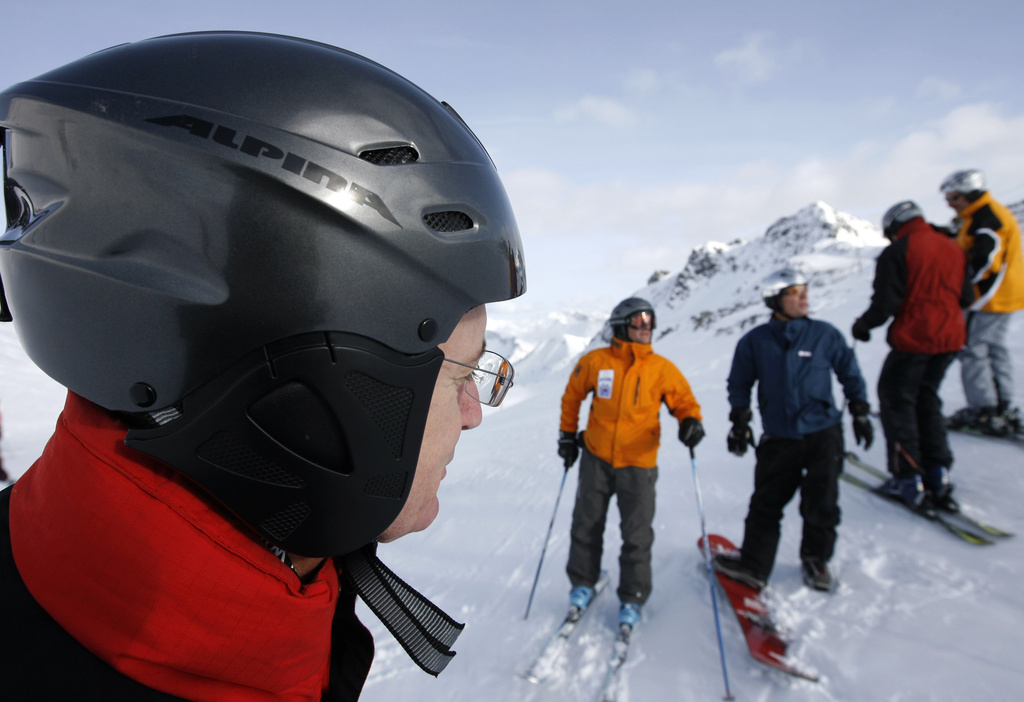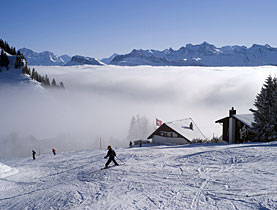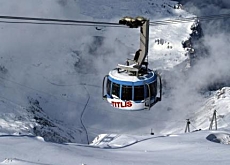Cool heads prevail on the ski slopes

The wearing of ski helmets will not become mandatory in Switzerland even though statistics show around 17,000 people suffer head injuries on the slopes each winter.
An organisation responsible for accident prevention in Switzerland believes making head protection obligatory would be counterproductive.
Nearly all children and youth wear helmets (97 per cent), and adults are catching up at 63 per cent. Only five years ago, the figure for them was only 16 per cent.
The Swiss Council for Accident Prevention says the increase in people wearing helmets in Switzerland is largely due to a campaign it launched two winters ago, which drives home the point that a helmet can prevent three-quarters of all head injuries.
“We’re running the campaign for the last time this season, and we’re putting the emphasis on the French-speaking part of the country where wearing a helmet is less popular than in German-speaking areas,” Frank Hofer of the Council told swissinfo.ch.
Despite its concern about the thousands of head injuries on the slopes each year, the organisation believes making head protection mandatory would become problematic.
Hofer says wearing helmets will only remain “cool” as long as it is voluntary. “Nearly 100 per cent of children up to 12 years of age wear helmets and its 90 per cent for teenagers. That’s an incredibly high rate.”
“We are appealing to adults to take responsibility for their own safety. And we are satisfied with the figures among adults. We don’t see any need to introduce repressive laws,” Hofer added, saying he did not think Italy where wearing helmets is required by law was a model to follow.
“Italy is not even close to reaching the rates achieved by Swiss kids even though it’s mandatory there.”
High profile accident
Snowboarders were the first to make wearing helmets trendy, and are credited in part with making it fashionable among skiers.
About three-quarters of the people taking part in a survey last winter said they wanted to see helmets become mandatory. Italy is the only country neighbouring Switzerland where it is obligatory for everyone, and enforced by the ski patrol.
Austria is making it mandatory for children this winter. “It’s cool to wear a helmet,” said Peter Schröcksnadel, the president of the Austrian Ski Federation.
Around the same percentage of people are now wearing helmets on the Austrian slopes as in Switzerland. The reason for the boom is believed to be the serious accident that German politician, Dieter Althaus, was involved in on New Year’s day, 2009.
Althaus survived but the 41-year-old cross-country skier he collided with in a resort in Austria’s Obersteiermark region died from her injuries.
Playing it safe
Hofer does not think France, Germany and Austria will introduce a law anytime soon, which would force Switzerland to follow suit.
While Switzerland’s ski lift companies are responsible for the condition of the slopes and the infrastructure, each skier is responsible for his own actions, he said.
“The ten rules for conduct from the International Ski Federation should be followed. Then you know you are playing it safe,” Hofer concluded.
Jean-Michel Berthoud, swissinfo.ch (Adapted from German by Dale Bechtel)
The International Ski Federation (FIS) Rules for Conduct are posted at all Swiss ski resorts.
The 10 points call on skiers to show respect, be in control of their speed at all times, gives advice on how to overtake other people on the slopes, to adhere to all signs and markings and provide assistance in case of an accident.
There are 650 mountain transport and ski lift companies in Switzerland.
With 11,000 employees, they are a key economic factor in mountain regions.
The companies have a combined annual turnover of approximately SFr840 million ($813 million), of which around 25% is reinvested in maintaining or purchasing new infrastructure.

In compliance with the JTI standards
More: SWI swissinfo.ch certified by the Journalism Trust Initiative













You can find an overview of ongoing debates with our journalists here . Please join us!
If you want to start a conversation about a topic raised in this article or want to report factual errors, email us at english@swissinfo.ch.